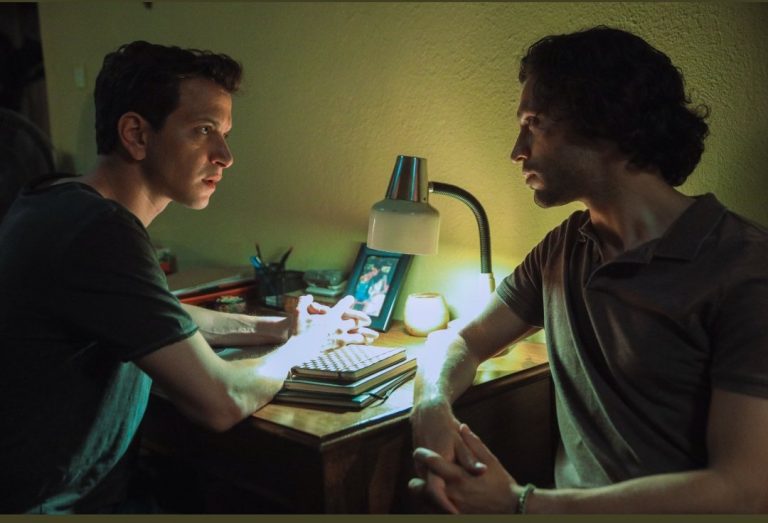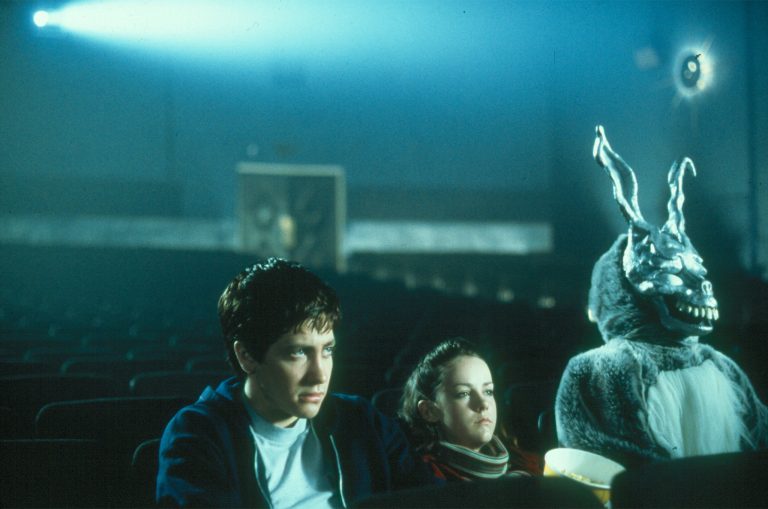I am one of those people who roll their eyes on just hearing the term romcom. There is something pernicious about two conveniently attractive people displaying unrealistic expectations. On top of this, when you watch a rom-com, you just know it is a rom-com; the lighting, the writing, and the directing scream that it belongs to the genre. All romcoms are very much indistinguishable and cater to a specific audience. This is why rom-coms are normally the last genre I seek in cinema. So, the only reason for me to even give “Punch-Drunk Love” (2002) a try was my admiration for Paul Thomas Anderson. Much like many other Indian cinephiles who got into cinema relatively late, my first introduction to PTA was “There Will Be Blood,” a sweeping epic in every sense of the word.
Going into Punch-Drunk Love, my expectations were not very high. I only knew it was a rom-com and that it starred Adam Sandler, you know, the “Happy Gilmore” and “Bill Madison” guy. But by the time I reached the film’s end credits, I found a personal connection with Sandler’s Barry Egan. An unprecedented feeling enveloped me. I had never felt so connected to a fictional character in my life. Now, after seeing the movie at least 20+ times, I can say without an ounce of hesitation that “Punch-Drunk Love” is the Greatest Romcom of All Time that is forever relevant and eternally giving. You may now ask, what makes it so food? Yes, my dear reader, I will get into that in the article below, but I won’t hear any counterargument against my assessment; THAT’s THAT!
2002’s Punch-Drunk Love’s Arrival Onto the World Out of Nowhere
Paul Thoms Anderson made “Magnolia” in 1999, a meticulously constructed drama with a stacked cast. “Magnolia” got PTA the critical acclamation for his stupendously accurate portrayal of the human condition. After “Magnolia,” an arthouse Adam Sandler movie, is the last thing you would expect him to helm, that’s as unlikely as Halley’s Comet. Apart from a baffling casting decision, “Punch-Drunk Love” was also a venture into unfamiliar territory of romcom for PTA. So, it randomly unannounced itself to the world out of nowhere. Maybe it was his madness for finding eccentric ways to approach a story. Perhaps it was just his way of welcoming the audience to his heart. Whatever it was, PTA gave a wild spin to the conventional tropes of romcom and made something awkward, frenetic, uncomfortable, and energetic in the form of “Punch-Drunk Love.”
PTA’s Wild Twist to A Rom-Com Leads
Unlike a conventional rom-com like, say, “When Harry Met Sally,” the leads of “Punch-Drunk Love” are not two opposite individuals on a journey of self-discovery in which their relationship will be the catalyst. In “Punch-Drunk Love,” PTA gives us Barry, a reserved, reticent outcast (on the autistic spectrum) who is emotionally abused by his sisters and is being scammed by a call girl service. And Lena Leonard (Emily Watson) is a kind, considerate, and non-judgemental outcast. These two outcasts are not on a journey of self-discovery. They are not actively seeking a purpose in life. What they are seeking is harmony. So, “Punch-Drunk Love” essentially becomes a journey of these two lost souls, oscillating from disharmony to harmony with each other’s mental support.
The story is essentially a regular romance, but the intricacies in the character writing elevate it to a great extent. The casting of Adam Sandler and Emily Watson also has to do something with the film’s exceptional quality. Before you proceed to cancel me, I don’t mean to say that they are not attractive (looks are subjective, after all). They just do not fit Hollywood’s definition of two conveniently attractive people. Adam Sandler, who is known to star in ludicrous comedies that are sometimes funny and sometimes obnoxious, is the PTA’s protagonist in this rom-com, who is anything but a charmer. With his acting prowess, Sandler breathes a new life into a protagonist who is awkward and indecisive, a far cry from a charming rom-com lead.
For the female lead, you have Emily Watson, who, while looking kind and compassionate on the outside, carries a very complex persona gracefully. This is evident from her scenes of stalking Barry across the pudding aisle and her quirky conversation with Barry about wanting to smash his face with a hammer and scooping out his eyeballs. Whenever Emily is on screen, she carries a mystical vibe with her. We never fully know about Lena, but Emily expertly turns up a memorable performance, abstaining from overdoing or underdoing her character. It also has something to do with PTA’s exceptional writing, never letting her character become dull and flimsy. Both Barry and Lena embody the most eccentric characters ever seen in a rom-com, but in such an achingly human manner that you can’t help grinning like an idiot seeing them on-screen.
Flirting with the usual tropes of Romcoms

On the surface, “Punch-Drunk Love” feels like the usual romantic tale. It doesn’t have the most novel story to tell. Yes, it is infused with peculiar elements of phone sex-line scammers, but in the end, if you look at its story on paper, it gives you the taste of most rom-com tropes. But, what makes it cut above the rest is the staggering storytelling of PTA, where he constantly flirts with the rom-com tropes, giving them a wild twist at every turn. Again, this is because PTA understands the human condition better than most filmmakers out there.
In the film, the first date of Barry and Lena doesn’t make your heart flutter; it constantly makes you uncomfortable. PTA puts you into the psyche of Barry not being able to cope with constant harassment by his sisters, ending up punching a wall. The astounding touch of realism in this date is something you would never see in any other rom-com. PTA doesn’t hesitate to illustrate Barry’s isolation and vulnerability even if it makes the audience uncomfortable and anxious.
Another instance of PTA’s Midas touch on the rom-com genre is how he expertly crafts kissing scenes with the characters, communicating something poignant yet deserved. For what is a successful rom-com, if not one where the audience wants the two characters to find each other? If those sweet and tender moments don’t feel earned, the audience will simply not buy it. The first kissing scene with Barry and Lena at the former’s workplace gives Barry an unprecedented feeling of affection he had never experienced before in life.
Topping this is the second kissing scene after Barry and Lena’s date. Unconventionally, Barry walking Lena to her door doesn’t end with a kiss in a Hollywoodish manner. Barry wanted to kiss her but couldn’t muster enough courage to do so. Lena calls him back and asks (read commands) him to kiss her. Barry runs back to her all sweaty, and they kiss in one of the most cathartic moments in the film.
PTA understands humans in all their awkwardness, so even if we get a kissing scene at the end of Barry and Lena’s date, it isn’t something Hollywood has assaulted us with over the years. It is instead something more authentic to life and more relatable. But it still isn’t as iconic as the kissing scene of Barry and Lena in Hawaii at their reunion. This scene gets my vote for the most tender and intimate kissing scene ever shot. With whip pan camera moment emphasizing the intimacy between the characters and the music from Shelley Duvall’s “He Needs Me” underlining their affection for each other, this kissing scene makes you feel a gamut of emotions in 40 seconds.
The Reinvention of Humour in a Romcom
Alright, enough talk about romance. If I label a movie “the greatest rom-com ever,” I have to give some arguments that showcase its brilliant use of humor. It is called a rom-com, after all! Thankfully, in this case, PTA has efficiently taken care of comedy for me to put up a strong argument. At this point, I have started sounding like a broken record citing how unconventional and eccentric “Punch-Drunk Love” is. But what should I do when a movie gives you so much to talk about?
The humor in the film has a spontaneity and hails from the inherent sadness of the lead character. Barry’s weird obsession with pudding, his crippling isolation, and his loneliness leads him to call a phone-sex line that brings forth the uninvited trouble, and Philip Seymour Hoffman’s frenetic energy in the film all churn out gold moments of humor. It comes at the expense of illustrating the prevalent autism in Barry and his mistreatment by the people around him. In fact, it is a stark contrast from the optimistic ‘American Humour’ in other rom-coms.
Most things in “Punch-Drunk Love” (except PSH’s iconic “Shut Up” line) are intentionally funny, but the incongruity and lack of normality in Barry stand out and make us laugh. The laughter is the release of tension the movie constantly puts us into. In many ways, Barry’s incompetency mirrors our flaws as humans and delves into a more sophisticated territory of humor. This is again because of PTA’s unparalleled knowledge of the human condition, its absurdities, vulnerabilities, strengths, and weaknesses.
“Punch-Drunk Love” is the amalgamation of all these human characteristics presented with the exceptional directing prowess of Paul Thomas Anderson and elevated by the acting performances and technical aspects of some of the most talented individuals in the industry. It meticulously plays a delicate dance of romance, comedy, and tragedy and cements its position as the greatest romance comedy ever created.
Read More:
Why The Big Lebowski (1998) Is Beloved?
“Killers of the Flower Moon” and the Politics of Martin Scorsese
Why Oppenheimer is Christopher Nolan’s Best-Directed Film Yet?



![On the Count of Three [2021]: ‘Sundance’ Review – Constantly funny bromance takes a sharp look at men’s mental health](https://79468c92.delivery.rocketcdn.me/wp-content/uploads/2021/02/On-the-Count-of-Three-Sundance-Review-768x432.jpg)

![Richard Jewell [2019] Review –An Uncomplicated yet Engaging Drama about Injustice](https://79468c92.delivery.rocketcdn.me/wp-content/uploads/2020/01/Richard-Jewell-2019-768x432.jpeg)

